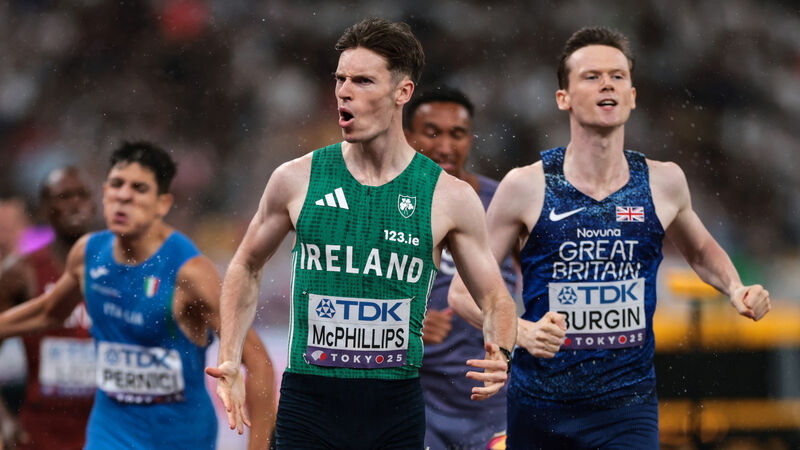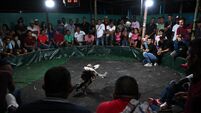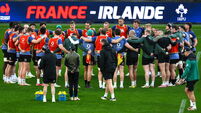Cathal Dennehy: Cian McPhillips' talent was hiding in plain sight, now everyone can see it

Cian McPhillips has learned from each of his mistakes in recent times. “I’m kind of glad I made all those mistakes because I haven’t come close to making them again," he said. Pic: ©INPHO/Morgan Treacy
He made it look easy. That was what was most striking. And it’s not easy. Not remotely. What Cian McPhillips achieved at the Japan National Stadium on Thursday – reaching the world 800m final – was so extremely difficult, such a rare and precious achievement, that no Irishman had ever done it.
And we’ve had some very, very good ones.
But it went beyond that: no athlete in history had run this fast – 1:43.18 – in the semi-finals of the World Championships, the 23-year-old Longford athlete splashing across that rain-soaked track with the frightening speed of a high-powered jet ski.
But it went beyond that too. McPhillips ran his first lap in 51.92 and his second in 51.26. If you’re not a middle-distance nerd, then you don’t need to be bored with the physiological reasons why 800m athletes almost never run personal bests with a negative split, but take my word on this: it means McPhillips can run much quicker.
At events like the World Championships, there’s an easy way to tell when an Irish athlete is making a big impact: journalists from other nations ask you about them. On Thursday night, a US reporter who does research for NBC asked how Cian was pronounced, looking to pass it on to their commentators. Yesterday morning, a statistician with the BBC reached out, asking what exactly had caused McPhillips’ promising career to stall as he transitioned to senior level.
The implication was clear: they expect him to be a big factor in this world final, and very few in the athletics world knew much about him. Which is fair enough. No one expected this. McPhillips and his coach, Joe Ryan, knew something big might be in the works, given how well he was motoring in training, but an Irish record in the rain, off a negative split, while taking an unbeaten path to a global final? No.
It was a mark of McPhillips’ expectations at his debut World Championships that when his parents were toying with the idea of travelling, he did his best to put them off. “I’d say they’re raging,” he said with a laugh. “I told them not to bother. I said to save it for [the Europeans in] Birmingham next year – that I’d make sure I’m in shape for that.” To most outside of Irish athletics, McPhillips is a new face, suddenly up there with the world’s best. Where did he come from? Well, in truth, his vast talent has been hiding in plain sight for many years. Now it has just fully bloomed.
McPhillips was the kind of standout teenage talent that comes along maybe once or twice a decade – on par with Rhasidat Adeleke or Ciara Mageean. He’d gone to the European U-18s in 2018 as a contender but got clipped, lost a shoe and trailed home 14th in his heat, unable to show his ability at an event where Adeleke and Sarah Healy announced theirs by winning gold.
The following spring, aged 16, he ran a 3:46 1500m indoors – the equivalent of a 4:03 mile. In 2020, he went to the Millrose Games in New York and smoked some of the top US high school milers. In 2021, he kicked to 1500m glory at the European U-20 Championships, joining a roll of honour that included Josh Kerr and Jake Wightman – who both went on to win senior world titles.
But then the problems started. McPhillips studied theoretical physics at UCD and the workload proved fiendishly difficult to juggle with elite-level training.
“When you go to college, it’s a big transition and a lot of stuff comes at you that you’re not used to,” he told me on Thursday. “I’d have really liked [the course] if I wasn’t running, but it’s not the easiest thing to study when you’re tired. It made me pretty tough, trying to work through that. I made a lot of mistakes, but as long as you commit to only making them once, eventually it will start to click.”
Injuries also popped up. Nothing huge. Just finicky things that struck at the wrong time. Just before the European U-23s in 2023, he hurt his lower back by not bracing his core while doing a squat, then finished a disappointing seventh in the 800m final. “Stupid stuff like that,” he said. “It wasn’t a lot of missed time. It was just me being an idiot and maybe not looking after myself properly.”
Each error offered a lesson, and McPhillips assimilated them all. “I’m kind of glad I made all those mistakes because I haven’t come close to making them again. Sometimes it just takes a while. I think I’m a prime example [that] if you keep trying, you’ll make it.” He's been coached for many years by Joe Ryan and McPhillips is effusive in his praise of the Mullingar Harrier, also crediting the impact of strength and conditioning coach Martina McCarthy and physio Ciara McCallion at the Sport Ireland Institute.
“Some people give out that maybe you can’t do it in Ireland, maybe the environment isn’t there – I haven’t had that experience,” he said. “I’ve a fantastic setup and a number of people supporting me.” The weird thing about this year? His path has been anything but smooth. At the European Indoors in March, he fell in his 800m heat and after being advanced to the semi-final, he took a hefty dose of anti-inflammatories to be able to race. Bad idea. McPhillips soldiered around but was soon diagnosed with a grade 2C tear in his soleus.
He missed 11 weeks of training, only getting back in late May. But that proved a blessing in disguise. McPhillips hammered the cross-training while unable to run, averaging two and a half hours each day on an assault bike, doing gruelling, stomach-churning sessions, while his easy days involved three hours on an elliptical – in addition to all his strength work and rehab.
He did sessions in the heat chamber at the Institute, his sights always trained on Tokyo. “It was rotten. It was really rough what I was putting myself through, but it all paid off. It made me a lot mentally stronger and it forced me to actually learn a lot more about the science of what I’m doing. I’ve learned so much about what not to do.”
At UCD, he’s now studying financial maths, spacing the course out to allow him more time to train. At 23, he has grown up, filled out, striking a healthy balance between athletics and academics. The late slot of this year’s World Championships has also been a saviour, allowing him to bring his fitness to the boil when some rivals are running on fumes.
And on Saturday, at 2.22pm Irish time, he will take his shot at Ireland’s first world outdoor medal since Rob Heffernan’s gold in Moscow 12 years ago. Against him are the three Olympic medallists from Paris. But McPhillips won’t be overawed. “I don’t give a damn who you are – you have to go for them,” he says. “I’ll happily shove any of them on to the in-field if they try to take my spot. You can’t give these guys any respect.”
He won’t. He’s worked far too hard, for far too long, to go and dial it in now. Come what may, this one won’t be easy. Such is the way when you reach the top of the world – where he looks very much like he belongs.



